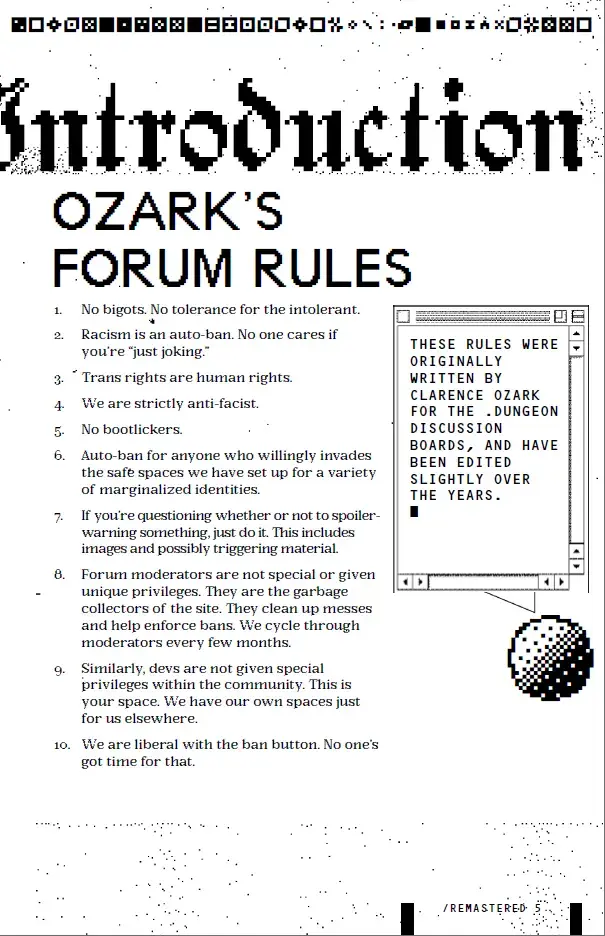The call to action button is the free plan, with subscribe having a secondary button style. That alone makes it clear they want to show you ads more than they want you to subscribe.
A hobbyist game dev, professional software engineer, and incremental connoisseur. I’m the creator of Profectus. He/him
- 0 Posts
- 22 Comments

 4·1 year ago
4·1 year agoI’m also still interested in the xmpp vs matrix debate. I’m using matrix ATM because it seems more actively developed and used, but I know some people still swear by xmpp. Ultimately I really just want a decentralized alternative to discord, but beyond that I feel like I’ll just want to go to whichever alternative has the most users, since that’s pretty useful for chatting software.
I’ve heard feedback that matrix doesn’t seem to be very united, with different groups implementing different competing features proposals etc., which does seem to be a pretty big issue.
I’m also pretty optimistic about a lot of the new stuff being built on matrix. I recently became aware of Commune, which is about making sections of matrix servers web searchable, and that sounds incredible - one of my biggest issues with discord is how often it gets used as effectively game wikis, collecting all these guides and information that’s only accessible through a proprietary discord account. No anonymous search.

 1·1 year ago
1·1 year agoI’m not ready to really degoogle my phone, but wow next DNS has a lot of cool features! Thanks for the recommendation
I’m not sure I agree with the take that blahaj.zone has a facism problem. They’re explicitly anti-tankie and anti-nazi, which are the authoritarian end of the political spectrum. It’s a very left leaning space, and I think anyone in the lower left quadrant, e.g. libertarianism to anarchism and socialism to communism, would be well received.
I mean hey, by all means if you think a community is too hive mind-y or echo chamber-y then by all means don’t join. That’s the beauty of small highly customized communities - it can be moderated in a way all the members agree with, and anyone who doesn’t like it can find or found a different one.
I don’t know what exactly you’re imagining such a community would disallow, but I feel like whatever it is, I’d agree with it being disallowed. Disagreeing with someone is typically fine in most communities I’ve seen, it’s just hate speech or any -ism or -phobes that aren’t. And that’s fine.
I probably should’ve clarified its the last few that I felt were relevant to this post. I understand it sucks when you feel like anything you say may get you banned due to someone else’s interpretations, but in practice I don’t think it really becomes an issue.
Perhaps be a bit more careful when first joining a community as you learn how the community tends to act and behave, and where the lines tend to be drawn, but then after that you should have a general sense of what’s allowed, and if you do go over the line the mods are much more likely to just give a warning instead of a ban if you’re a regular.
A ttrpg called .dungeon got a remaster recently and I keep coming back to one of the screenshots on the store page, because I’m such a big fan of the rules for community moderation it enumerated:


 2·1 year ago
2·1 year agoI didn’t assume you were a fan of suburbs, I just read your comment about cities being blights upon the earth and argued why I think suburbs are more blight-like.
The only assumption I made about you is that you’d appreciate an appeal to environmentalism, since you called earth our beautiful planet

 4·1 year ago
4·1 year agoThat’s a very fair point, and one I agree with. I also think it’d help to move away from capitalism though. Capitalism is the force that encourages so many companies to throw away excess food rather than give it away, because doing so would lower demand and be “bad for business”. If we could just reduce our food waste that alone would do wonders in decreasing land use for farms, monoculture or otherwise.
I also think, over time the world should become more vegetarian. Even if you believe in food chains and that it’s okay for us to eat meat in general, the farming of animals often in cartoonishly cruel conditions solely for our consumption is abhorrent. Moving from meat based diets to (at least mostly) plant based is a moral necessity, and on top of that will massively reduce emissions (15% comes from livestock), land use, and biodiversity loss

 131·1 year ago
131·1 year agoWalkable cities produce less pollution per capita than suburban or rural areas due to less pollution from commutes and increased efficiency delivering utilities (due to the population density).
Suburban sprawl is what truly makes ugly stains on our word - concrete everywhere, destroying the watershed, with no native grass in the medians, and so many cars spewing out fumes, micro plastics, and disrupting migration patterns. They’re depressing places to live.
Older rural areas are actually typically much more walkable than American cities. Keep in mind, rural towns were very common before cars existed. They’re typically structured to have a small center, sometimes basically just a “main street”, with all the places you need to regularly visit, and houses surrounding them, and the farmland surrounding that. This way the people are all relatively close, and the farmland is not between you and others. These towns are all about self sufficiency within the community, but ofc if you keep a car for when you need to travel somewhere else that’s fine, and no one is begrudging you for using gas powered farm equipment on your farm. The main point is you don’t have a daily commute that requires a car, because it’s either your farm or one of the lose shops that are close to everyone.
And for what it’s worth, a lot of train networks used to go to these rural towns as well, and it’d be awesome to see those return for Intercity travel.
You’re correct, I am unfamiliar with driving in the US - I’ve lived here my whole life, but have made it into my mind 20s without a license. Needless to say, I don’t live in a particularly rural area (I live in a suburbs where I can ride my electric bike to nearby stores or the train to commute downtown). I wasn’t trying to suggest people pass on the shoulder though. I hadn’t thought of winding roads, but that’s a fair point where there could potentially be two lanes but it’s still not safe to pass. For the single lane scenario I still don’t think it makes sense to suggest a giant RV regularly move into the shoulder (if it’s even present), especially not “any time there is a car behind them” as has been suggested elsewhere in the thread.
Regardless, in general I think it’s more important to strive for systemic solutions rather than expecting/hoping for/pressuring all individuals to act in the way you want. In this case, since we’re talking about rural areas, I think fixing our broken rail network would help immensely. Building the network and corresponding culture around trains for inter city travel would be cheaper for individuals and the government, better for the environment, would allow everyone on board to relax, and it’d even be faster than driving. For popular vacation locations the frequency could even be high enough to eliminate the last barrier of it being on a sometimes inconvenient schedule! Now, of course the locations themselves may not be easily traversable without a car (and trust me I’m aware of how often that applies), but if you’re trying to escape concrete jungles anyways then perhaps walking around was the goal anyways. Otherwise, you can probably rent a car (or a bike!) and still save money compared to the fuel and maintenance cost on driving the vehicle there.

 232·1 year ago
232·1 year agoDid you know we throw away more food than it would take to feed the hungry? That there are more empty homes than homeless people? Capitalism incentivizes scarcity, so it is artificially created. The only thing stopping us from achieving post scarcity immediately is working out the logistics, but those in power don’t want that to happen, as they are currently high up in society.

 21·1 year ago
21·1 year agoI don’t think that’s what the previous commenter was suggesting, but sure slower vehicles being in the rightmost lane makes sense and is also taught in American driving schools.
Hell even in a car there’s a car behind you most of the time. I can’t believe your suggesting they literally detour at every single moment. That’s adding a hell of a lot more than 25% to the trip duration
So how frequently do you think rv drivers should pull off to the side of the road to let cars pass them? I find it hard to believe they’ll be having meals, restroom breaks, or naps with the frequency you desire. Also, I’m not sure what kind of road has room for you to pull off to the side of, but not an extra lane for passing. I also am not sure what roads you’re talking about where an emergency vehicle is going to be stuck behind an RV for a long enough period for it to matter - if there’s no closer hospital, then by the point an RV would make a difference between life or death they’re probably just going to send out a helivac.
Just to be clear, I’m not an RV owner and I sympathize with your IBS. In fact I have no vehicle, and support plans for public transit and similar ways of reducing congestion and improving people’s lives (like a lane solely for busses, taxis, and emergency vehicles, like several European cities have had success with). I just don’t see a need to blame RVs for their slightly slower speeds, over systemic infrastructure issues that are the primary reason for congestion.
Are you suggesting rv drivers regularly take random detours so as to not “inconvenience” other drivers? Dude, just let them get to where they’re going

 2·1 year ago
2·1 year agoKeep in mind America was bulldozed for the car - there is precedent for large areas being massively transformed, and suburbs can absolutely be redesigned to be more walkable. A big issue with most suburbs is zoning that prohibits anything but single family residences. That means corner stores are literally illegal to build, alongside mixed use buildings, and other things that enable communities to be nicer to exist in, more friendly, and more convenient.
In addition to zoning laws, roads can be redesigned to be safer and more friendly to other modes of transit - and roads already need to be replaced every couple of decades, so theoretically within that time span every road could be improved in this way. More lanes have never reduced traffic in the long-term, but building infrastructure for denser modes of transit like busses or bikes or pedestrians does.

 7·1 year ago
7·1 year agoI’m going to give a narrower scope and mention something that bothers me in my neighborhood. I can bike to a park and ride for a bike-friendly train that goes directly to downtown with a decent frequency, which is fantastic! Unfortunately it’s really only accessible by car, and I have to take quite a significant detour to get to it without needing to ride ~a mile on a very fast very busy main road without sidewalks :(. We’re so close!

I think they mean in the sense that it’s not a native desktop app (or mobile)